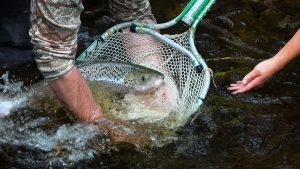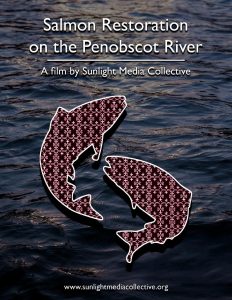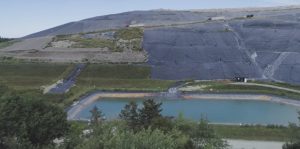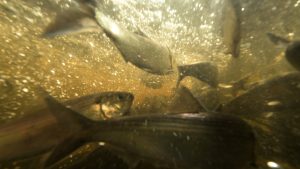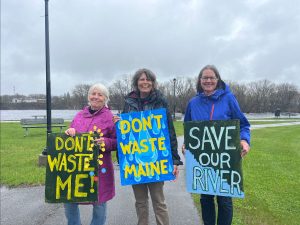Per and polyfluoroalkyl substances (PFAS) are a large class of man-made toxic chemicals that are present in a wide variety of common materials, from fast food wrappers to nonstick pans. These substances are often collectively referred to as “forever” chemicals because they take very long periods to break down in nature. Likewise, PFAS is stored in the body and has many harmful effects on humans and animals alike, including cancer, liver damage, decreased fertility and increased risk of thyroid disease and asthma. Since the 1950s and 60s, PFAS manufacturers Dupont and 3M knew from their own studies of the dangerous health impacts, but covered-up the science for decades.
Juniper Ridge Landfill, state-owned, but privately run by Casella Waste Systems, is located just one mile upriver from the Penobscot Nation reservation. Recent testing has revealed that PFAS has been detected at alarming rates in Juniper Ridge’s leachate. Though the state does not have a safety standard for PFAS levels in surface water, the rates of six different kinds of PFAS chemicals detected in the Juniper Ridge landfill leachate exceed the state drinking water standard (20 parts per trillion) by nearly a factor of twenty. The Juniper Ridge leachate is taken to the waste water facility at Nine Dragons (ND) Paper Mill in Old Town, just one mile downriver from Penobscot Nation. The leachate is then treated with chemicals and dumped directly into the Penobscot River, though conventional wastewater treatment plants are not effective at removing PFAS contamination. As current practices stand, these “forever chemicals” are being pumped into the river totally untreated, which may have devastating consequences.
PFAS is the most recently detected pollutant of many found in the river including mercury and dioxin This further toxification of the Penobscot River permitted by the State of Maine is having drastic impacts on the Penobscot people, who have relied on the river since time immemorial as a main food source. Current mercury and dioxin contamination rates in the river allow for only 1-2 fish meals per month to be consumed without adverse health impacts, which is well under what is required for Penobscot people to engage in sustenance fishing, which the Tribe has a sovereign inherent right to practice. State standards, however, do not include PFAS testing safety levels for the fish.
Nearly one third of the total waste that is brought to Juniper Ridge Landfill is brought from out-of-state due to the state of Maine utilizing a loop-hole which renders out of state waste “in-state” waste so long as it is brought to a processing center in Maine before being dumped in a landfill. Community members across Maine have tried repeatedly to show that the State’s rules are not protective of environmental and human health, curtail the public’s participation and the consideration of impacts on affected communities, and have not only allowed, but encouraged a proliferation of out-of-state waste into Maine, resulting in a growing for-profit business using Maine’s publicly owned landfills, and taking advantage of renewable energy credits. Concurrently, other surrounding states have increased restrictions on the burning and landfilling of trash, including toxic Construction and Demolition Debris (CDD), increasing the profitability for businesses importing trash into Maine for incineration and landfilling. Citizen efforts for reform have been continually and successfully opposed in Maine’s legislature by the waste industry’s powerful lobby.
On this Monday, January 24th, 2022, the Maine Legislature’s Committee on Environment and Natural Resources will examine two pieces of legislation that could impact Maine’s disposal of PFAS chemicals, as well as a hard-fought hold over from last session, a bill that would close a loophole that permits out of
state waste to be minimally processed and then accepted at State owned landfills. It also adds environmental justice to the public benefit determination standards for solid waste disposal facilities.
At 9am there will be a public hearing on LD 1875 An Act To Address Perfluoroalkyl and Polyfluoroalkyl Substances Pollution from State-owned Solid Waste Disposal Facilities
And LD 1911 An Act to Prohibit the Contamination of Clean Soils with So Called Forever Chemicals
At 1pm the ENR Committee will hold the work session on last session’s hold over bill LD 1639: An Act To Protect the Health and Welfare of Maine Communities and Reduce Harmful Solid Waste which seeks to amend the definition of “waste generated within the State” and adds environmental justice to the public benefit determination standards for solid waste disposal facilities.
Those wishing to testify, can sign up here up to a half hour before the 9am hearing:
– Click Public Hearing
– Select Environment and Natural Resources Committee
– Select Jan 24th
– Select LD1911 (if you want to testify on both, I think you need to go through
this twice, and then click LD1875)
– Click ” I would like to present my testimony live.”
You do not need to upload your testimony if you are testifying live.
You can also submit written comments at this site.
Contributors to this article include Sunlight Media Collective members: Lokotah
Sanborn and MD

